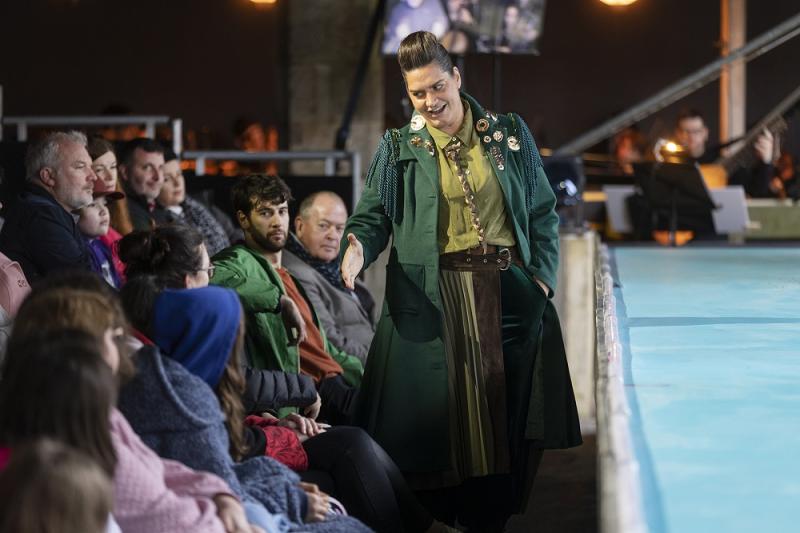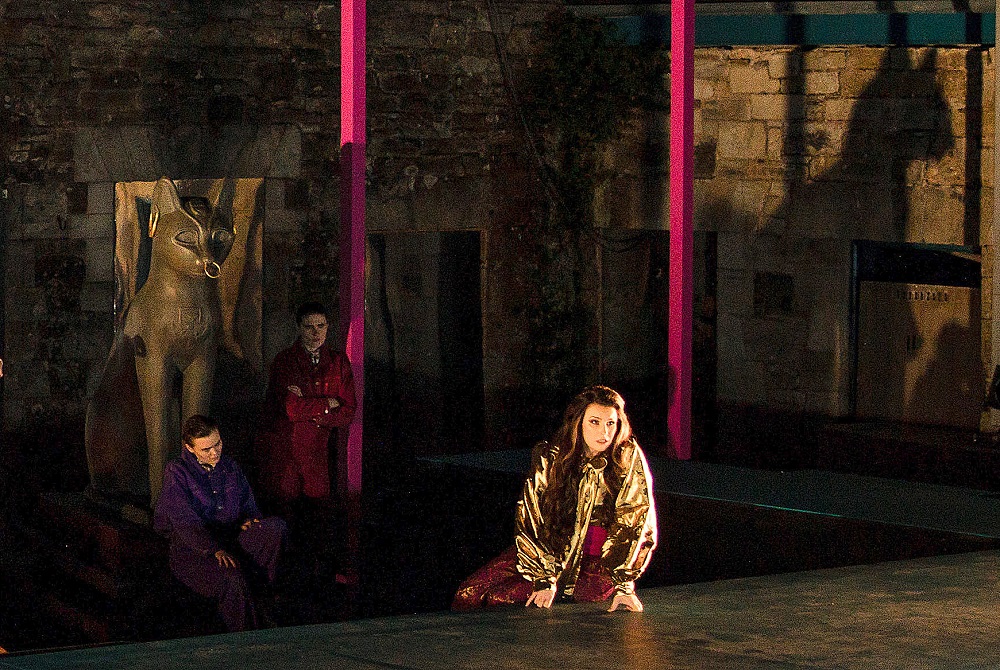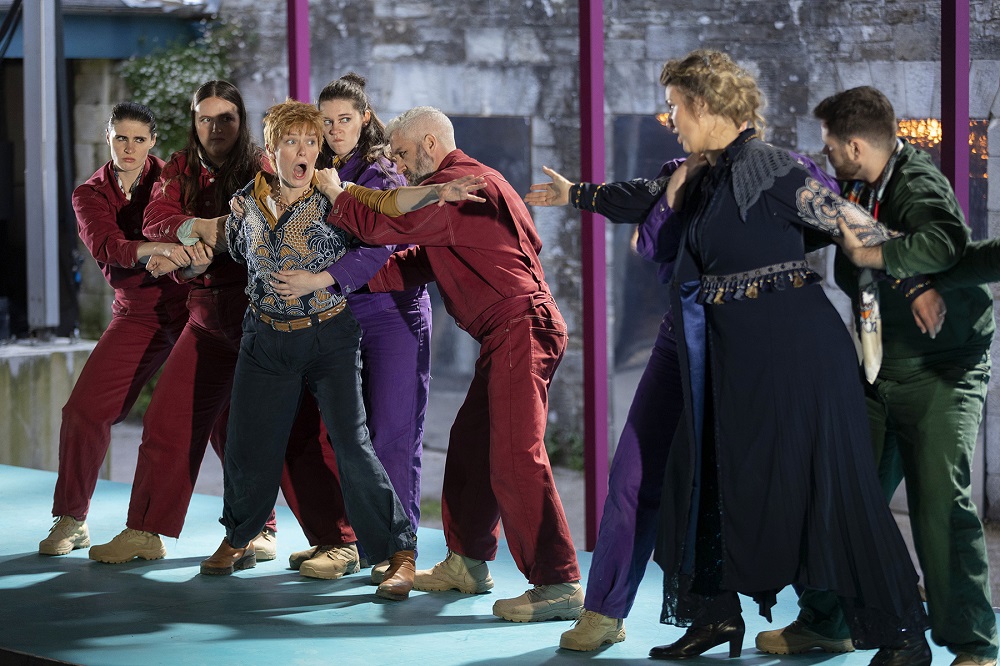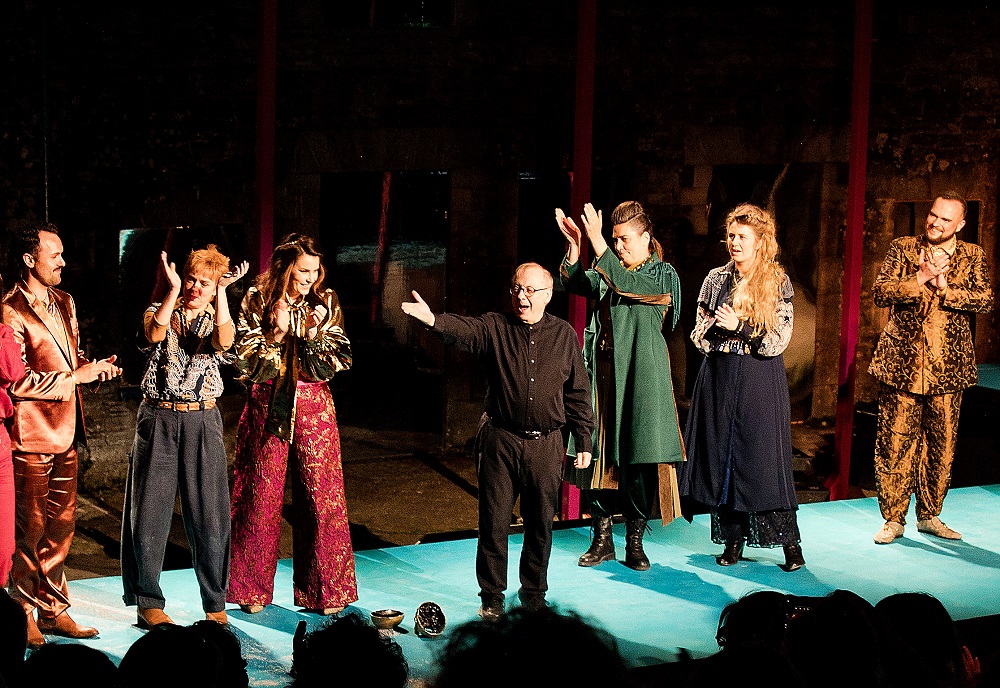Giulio Cesare, Blackwater Valley Opera Festival review - characterful, lustrous Handel on parade | reviews, news & interviews
Giulio Cesare, Blackwater Valley Opera Festival review - characterful, lustrous Handel on parade
Giulio Cesare, Blackwater Valley Opera Festival review - characterful, lustrous Handel on parade
An infinitely various cast compels as the splendour falls on castle walls

Recreating Handel’s Egypt with a first-rate cast on the summer opera scene could have been the exclusive domain of Glyndebourne, bringing back its revival of David McVicar’s celebrated Giulio Cesare in July. Yet over the Irish sea, in the grounds of a castle with exquisite gardens above the lushly wooded valley of the river Blackwater, they’ve pulled it off. This is a singular triumph of which Caesar would be proud.
Modest budgeting means a spare but effective and unfussy production from Tom Creed which brings out the best in everyone, and the Irish Baroque Orchestra under Nicholas McGegan, no less, is there to serve at one remove. As in the 2022 Orfeo ed Euridice, the players are stuck in a byre to the left of the audience, McGegan visible to those on stage via two large screens. The strings, running to a luxurious 19, still have to cope with the dryness, but acoustically it’s an improvement, with a wooden platform underneath the orchestra, and excellent obbligato players, including the fearlessly ornamenting horn-player Anna Drysdale, come closer to the action.  The singers are never less than transfixing, though it’s the world-class Irish, or Irish-born, contingent which delivers flawlessly. Anna Devin’s achievement as an infinitely various Cleopatra (pictured above) will not be eclipsed by Louise Alder’s eagerly-awaited characterisation at Glyndebourne. The joyous, sometimes sinuous ornamentations dazzle, and the depths are truly sounded with ravishing soft singing in “Se pietà” and “Piangerò” when the Egyptian queen finds herself in danger.
The singers are never less than transfixing, though it’s the world-class Irish, or Irish-born, contingent which delivers flawlessly. Anna Devin’s achievement as an infinitely various Cleopatra (pictured above) will not be eclipsed by Louise Alder’s eagerly-awaited characterisation at Glyndebourne. The joyous, sometimes sinuous ornamentations dazzle, and the depths are truly sounded with ravishing soft singing in “Se pietà” and “Piangerò” when the Egyptian queen finds herself in danger.
Equally dignified in distress is Carolyn Holt’s Cornelia, widow of the decapitated Pompeo, resonating with true contralto grief to offset the brighter tones of the marvellous Sharon Carty as her son Sesto, style-perfect. Though Creed’s production often lets the singers deliver without fuss, the arrest of mother and son is vividly realized with the eight-strong young chorus, called upon to act much more often than to sing, multiplying the energy as Holt and Carty move us with one of the two great duets in the opera. (scene pictured below wth Carty left and Holt right)  Also rock-solid is American baritone Dean Murphy, returning with aplomb to his Irish roots as Tolomeo’s henchman Achilla – luxury casting fulfilled to perfection. The power-wielders are, perhaps appropriately, more capricious. Creed should have got award-winning German countertenor Nils Wanderer to cut down on the mincing of a Ptolemy it’s hard to (p)tolerate – very often you have to look at the singers for whom less is more – and his technique is, shall, we say, singular, with some trumpet-like top notes and a lower register out of falsetto, and not much connecting line. But vocally he’s certainly compelling. Charismatic, too, and always strong in character, is Ingeborg Bröcheler’s Cesare, at first a strutting popinjay with Lea DeLaria’s hair and look-at-me-ness, evolving as a human being in true Handel manner: a contralto of a very different kind to Holt, not always easy with the runs and sometimes losing pitch, but ultimately very endearing.
Also rock-solid is American baritone Dean Murphy, returning with aplomb to his Irish roots as Tolomeo’s henchman Achilla – luxury casting fulfilled to perfection. The power-wielders are, perhaps appropriately, more capricious. Creed should have got award-winning German countertenor Nils Wanderer to cut down on the mincing of a Ptolemy it’s hard to (p)tolerate – very often you have to look at the singers for whom less is more – and his technique is, shall, we say, singular, with some trumpet-like top notes and a lower register out of falsetto, and not much connecting line. But vocally he’s certainly compelling. Charismatic, too, and always strong in character, is Ingeborg Bröcheler’s Cesare, at first a strutting popinjay with Lea DeLaria’s hair and look-at-me-ness, evolving as a human being in true Handel manner: a contralto of a very different kind to Holt, not always easy with the runs and sometimes losing pitch, but ultimately very endearing.
As so often in a work that English Touring Opera had to split into two evenings at full length, much has been cut, so second countertenor Iestyn Morris and bass Fionn Ó hAlmhain get even less to do. The pacing mostly feels right, except for the rapid jump between resurrected Caesar’s resolve to go and rescue Cleopatra and its achievement: cue blackout. The lighting after dark is good: Aedín Cosgrove deals with it well, and her set is dominated by giant statues of hippopotamus god Tawaret and cat goddess Bastet, produced from crates at the start, which let the singers, Cleopatra and Tolomeo especially, use them as they will. Catherine Fay’s costumes offer some handsome silks, but not always a good ensemble for each character.  Still, the evening passes mostly in a spirit of delight, the jackdaws, wagtails and starlings providing a vocal and visual counterpoint before the interval – referenced spiritedly by Bröcheler as more than metaphor in “Se in fiorito ameno prato,” though still outdone by Julia Kuhn’s violin carolling. The gardens of Lismore Castle surpass anything any English country opera setting has to offer - that's saying something given the floral wonders of Glyndebourne and the walled garden of the Wormsley estate which hosts Garsington Opera - and the whole atmosphere of relaxed enjoyment meets with the utmost discipline from singers and players (pictured above: the principals and McGegan salute the IBO).
Still, the evening passes mostly in a spirit of delight, the jackdaws, wagtails and starlings providing a vocal and visual counterpoint before the interval – referenced spiritedly by Bröcheler as more than metaphor in “Se in fiorito ameno prato,” though still outdone by Julia Kuhn’s violin carolling. The gardens of Lismore Castle surpass anything any English country opera setting has to offer - that's saying something given the floral wonders of Glyndebourne and the walled garden of the Wormsley estate which hosts Garsington Opera - and the whole atmosphere of relaxed enjoyment meets with the utmost discipline from singers and players (pictured above: the principals and McGegan salute the IBO).
I only caught one of the many events around the opera production, a genial, excellently programmed and presented recital at nearby Salterbridge House from present and previous winners of the BVOF/Royal Irish Academy of Music John Pollard Bursary, tenors Rory Lynch and Seán Tester and pianist Ella Nagy (also turning in a tumultuous yet crystal-clear Liszt Second Hungarian Rhapsody). As for the Cesare, I’d happily sit through it all again.
The future of Arts Journalism
You can stop theartsdesk.com closing!
We urgently need financing to survive. Our fundraising drive has thus far raised £49,000 but we need to reach £100,000 or we will be forced to close. Please contribute here: https://gofund.me/c3f6033d
And if you can forward this information to anyone who might assist, we’d be grateful.

Subscribe to theartsdesk.com
Thank you for continuing to read our work on theartsdesk.com. For unlimited access to every article in its entirety, including our archive of more than 15,000 pieces, we're asking for £5 per month or £40 per year. We feel it's a very good deal, and hope you do too.
To take a subscription now simply click here.
And if you're looking for that extra gift for a friend or family member, why not treat them to a theartsdesk.com gift subscription?
more Opera
 Madama Butterfly, Irish National Opera review - visual and vocal wings, earthbound soul
Celine Byrne sings gorgeously but doesn’t round out a great operatic character study
Madama Butterfly, Irish National Opera review - visual and vocal wings, earthbound soul
Celine Byrne sings gorgeously but doesn’t round out a great operatic character study
 theartsdesk at Wexford Festival Opera 2025 - two strong productions, mostly fine casting, and a star is born
Four operas and an outstanding lunchtime recital in two days
theartsdesk at Wexford Festival Opera 2025 - two strong productions, mostly fine casting, and a star is born
Four operas and an outstanding lunchtime recital in two days
 The Railway Children, Glyndebourne review - right train, wrong station
Talent-loaded Mark-Anthony Turnage opera excursion heads down a mistaken track
The Railway Children, Glyndebourne review - right train, wrong station
Talent-loaded Mark-Anthony Turnage opera excursion heads down a mistaken track
 La bohème, Opera North review - still young at 32
Love and separation, ecstasy and heartbreak, in masterfully updated Puccini
La bohème, Opera North review - still young at 32
Love and separation, ecstasy and heartbreak, in masterfully updated Puccini
 Albert Herring, English National Opera review - a great comedy with depths fully realised
Britten’s delight was never made for the Coliseum, but it works on its first outing there
Albert Herring, English National Opera review - a great comedy with depths fully realised
Britten’s delight was never made for the Coliseum, but it works on its first outing there
 Carmen, English National Opera review - not quite dangerous
Hopes for Niamh O’Sullivan only partly fulfilled, though much good singing throughout
Carmen, English National Opera review - not quite dangerous
Hopes for Niamh O’Sullivan only partly fulfilled, though much good singing throughout
 Giustino, Linbury Theatre review - a stylish account of a slight opera
Gods, mortals and monsters do battle in Handel's charming drama
Giustino, Linbury Theatre review - a stylish account of a slight opera
Gods, mortals and monsters do battle in Handel's charming drama
 Susanna, Opera North review - hybrid staging of a Handel oratorio
Dance and signing complement outstanding singing in a story of virtue rewarded
Susanna, Opera North review - hybrid staging of a Handel oratorio
Dance and signing complement outstanding singing in a story of virtue rewarded
 Ariodante, Opéra Garnier, Paris review - a blast of Baroque beauty
A near-perfect night at the opera
Ariodante, Opéra Garnier, Paris review - a blast of Baroque beauty
A near-perfect night at the opera
 Cinderella/La Cenerentola, English National Opera review - the truth behind the tinsel
Appealing performances cut through hyperactive stagecraft
Cinderella/La Cenerentola, English National Opera review - the truth behind the tinsel
Appealing performances cut through hyperactive stagecraft
 Tosca, Royal Opera review - Ailyn Pérez steps in as the most vivid of divas
Jakub Hrůša’s multicoloured Puccini last night found a soprano to match
Tosca, Royal Opera review - Ailyn Pérez steps in as the most vivid of divas
Jakub Hrůša’s multicoloured Puccini last night found a soprano to match
 Tosca, Welsh National Opera review - a great company reduced to brilliance
The old warhorse made special by the basics
Tosca, Welsh National Opera review - a great company reduced to brilliance
The old warhorse made special by the basics

Add comment